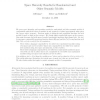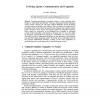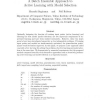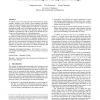264 search results - page 33 / 53 » Learning Linearly Separable Languages |
114
click to vote
ECCC
2007
15 years 2 months ago
2007
We prove space hierarchy and separation results for randomized and other semantic models of computation with advice where a machine is only required to behave appropriately when g...
139
click to vote
AISADM
2005
Springer
15 years 8 months ago
2005
Springer
Computer programming of complex systems is a time consuming effort. Results are often brittle and inflexible. Evolving, self-learning flexible multi-agent systems remain a distant ...
114
click to vote
NN
2008
Springer
15 years 2 months ago
2008
Springer
Optimally designing the location of training input points (active learning) and choosing the best model (model selection) are two important components of supervised learning and h...
174
click to vote
ICALP
2011
Springer
14 years 5 months ago
2011
Springer
We give new algorithms for a variety of randomly-generated instances of computational problems using a linearization technique that reduces to solving a system of linear equations...
116
click to vote
ML
2006
ACM
15 years 8 months ago
2006
ACM
We present a new way to generate type-error messages in a polymorphic, implicitly, and strongly typed language (specifically Caml). Our method separates error-message generation ...




